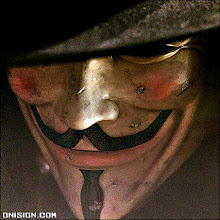How can we actually define anarchy? Is it possible? Here are a few definitions:
- a state of lawlessness and disorder (usually resulting from a failure of government)
wordnet.princeton.edu/perl/webwn - Anarchy, in its broadest sense, refers to the situation in which a human society exists without Government. ...
en.wikipedia.org/wiki/Anarchy - Anarchy is the condition resulting from an absence of governing forces. Often synonymous with chaos or disorder. Anarchism is the political philosophy that holds that the destruction of government authority will yield justice and equality in society. See discussion.
www.u-s-history.com/pages/h1451.html
It seems that, of those three definitions, only one actually refers to anarchy in a negative fashion; a state of lawlessness and disorder. This is the exact definition by which the media portrays anarchists. Why, you may ask, do they do this? Do they not have the same validity as a political organisation as other groups do? Of course not. They oppose the government. Why enter the game of politics when ultimately you wish to destroy it? There is no sense in it. That's not the reason why they do it. The reason that anarchists are portrayed negatively is because the media is a direct influence on capitalism and the economy. When war breaks out, the media profits. The media manipulates the economy. If a political organisation directly points to the media as a source of social injustice, how do they respond? They broadcast a message of idiocy and terrorism.
I'm not suggesting that this is the sole source of negative publicity for anarchy. In fact, there are numerous sources. The government, as is expected, uses propaganda to influence the ideals and the belief system of the society. Consider Hitler and his use of propaganda; people believed him. He used images. He used the newspapers. In fact, he published children's books which ordered the complete annihilation of the Jewish community. Of course, we advanced societies have other methods of propaganda. We use films. Look at V for Vendetta; this film was originally intended to influence the ideas of society on the possibility of anarchy. What did it become? A film filled with big explosions and annuciation to the dot. It was intended as a political film and it came out as an action film. Why? Because the government was afraid.
How then do we respond to this? I propose that you look to yourself, much rather than your televisions. Stop believing everything you hear. When your government tells you that you are going to war, ask yourself why. Always ask that question. Why? Why? Why? Soon enough, you'll realise nothing is intended at face value. You have to look deep between the lines. Why not look at the Iraq war as a basis? Didn't they say they believed that Saddam Hussein had weapons of mass destruction. It's funny, I've not seen one mention of those weapons since we went to war. Of course, Saddam was a dictator and needed to be removed but this was a secondary objective. Their first objective; occupation and control. Control the oil supply, gain a footing in the Middle East. Ask yourself why.
How then do we respond to this? I propose that you look to yourself, much rather than your televisions. Stop believing everything you hear. When your government tells you that you are going to war, ask yourself why. Always ask that question. Why? Why? Why? Soon enough, you'll realise nothing is intended at face value. You have to look deep between the lines. Why not look at the Iraq war as a basis? Didn't they say they believed that Saddam Hussein had weapons of mass destruction. It's funny, I've not seen one mention of those weapons since we went to war. Of course, Saddam was a dictator and needed to be removed but this was a secondary objective. Their first objective; occupation and control. Control the oil supply, gain a footing in the Middle East. Ask yourself why.




No comments:
Post a Comment